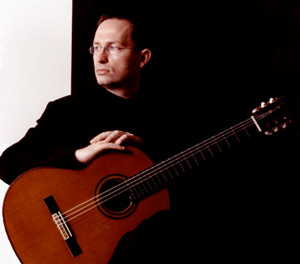by Mike Telin

Prior to his solo appearance on the Society’s International Series in October of 2011, we spoke with Azabagić about his career and his thoughts on music education. The following is an excerpt from that conversation.
Mike Telin: A friend of mine referred to you as the King of Competitions because you have been awarded 24 prizes. How did winning these prizes help to establish your professional career?
Denis Azabagić: I was fortunate to be successful at the competitions, and it was also a way for me to make money. But those competitions also gave me the opportunities for recording. Winning the Guitar Foundation of America competition was a fantastic help in establishing the beginning of my career in the U.S. As part of the prize I got a 50-plus concert tour, and it was a great opportunity to present myself all over the US and Canada.
MT: You and your wife, Eugenia Moliner, have a flute and guitar duo, Cavatina Duo. You have spoken about the influence her teacher had on you when you were both students in the Netherlands. How has this influenced your own teaching?
DA: Whatever you learn you pass on, of course. Her teacher, Jo Hagen, really opened up the music to me. I began to think about writing for the guitar like writing an orchestral score, so I could assign different instruments to every voice in a composition. It helps overall to analyze the music and to listen better to every voice, motif and color, and decide what you are going to do with them. It was great teaching that I received, and it helps not only with my own teaching but also in my performances.
MT: I read that it was the Beatles who made you want to start playing the guitar?
DA: As far as I can remember, yes. I remember liking the Beatles so much that I was thinking that I would end up in a rock band, but I picked up an electric guitar maybe twice in my life for about five minutes and that was it.
MT: What attracted you to the classical guitar?
DA: I think the main reason was my first teacher, Predrag Stanković. He was one of those special people that you find in your life who really have a tremendous influence. The other thing was that I liked the challenge. The guitar was far more difficult than any other problem I would encounter with my school work.
MT: How is it having two professional musicians in the house? Do you inspire one another?
DA: We rely on each other. A lot of times working with your spouse can be overwhelming and you get angry with each other. But again I think with maturity you overcome certain things and what stays underneath is that special feeling that you can rely on the other person. Then there is this tremendous thing of being able to travel and perform with each other; I find that very special.
In addition to having two musicians in the same house, our son plays the piano. I want to talk a little bit about this, because he has the talent and he can do the things, but he just doesn’t want to practice. But then again who wants to practice! The learning of music is complex — the language, the staff, the notes, and where these notes are on any particular instrument. Then the physical aspect of practicing it over and over again so that it stays in your muscle memory. Then over time you can add the overtone of art and interpretation. So it is a very complex process and I think it is so important for children to learn music. It certainly is not our aspiration for our son to become a pianist, but just to have music as part of his life. It really opens the brain in a way that is widespread. You have to have your attention on so many things in order to be able to play one piece. So I would suggest that parents seriously think of having their children learn music as part of their education.
MT: Yes, and you can take your musical training with you no matter what you end up doing in your life.
DA: Exactly! I recently read this book on my wife’s recommendation, Mastery by George Leonard. In it, Leonard talks about having the patience to practice. To just do your practice every day without apparent progress, but the progress is there. This is so important for us all to learn, especially living in American society where we are bombarded with the necessity of quick success and reaching our goals overnight because it feels so good. I remember when I came to the U.S. more than a decade ago. I opened the yellow pages and found an ad that said, “Learn to play the piano without practice.” I thought, who in the world could put out such an ad? I mean how can you lie like that — because that’s impossible. We would all like to get our things in life the easy way, but music is something that certainly doesn’t happen like that. And with anything that is worth pursuing there is hard work.
Published on ClevelandClassical.com July 6, 2016.
Click here for a printable copy of this article



